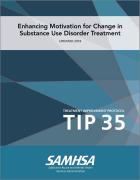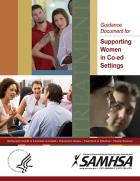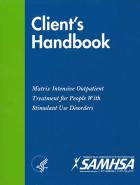This Advisory is based on TIP 35, Enhancing Motivation for Change in Substance Use Disorder Treatment. It addresses the spirit, application, and fundamentals of motivational interviewing (MI), discusses how practitioners can effectively employ MI in substance use disorder (SUD) treatment, and provides tools that practitioners can use to encourage and promote lasting positive outcomes for their clients.
Dashboard: Filter Bricks
Main page content


This flyer highlights key Psychological First Aid concepts and resources disaster responders and outreach workers may use when assisting individuals affected by the pandemic. It also provides resources for further assistance.

This updated TIP includes the latest evidence on motivation-enhancing approaches and strategies. It describes how substance use disorder treatment providers can use these approaches and strategies to increase participation and retention in substance use disorder treatment.

This guide offers best practices for treating women living with substance use disorders in co-ed treatment and recovery settings. It highlights the importance of gender differences, cultural sensitivity, and developing healthy relationships.

This guide provides guidelines for brief treatment and counseling with adults living with a marijuana dependence. It describes common treatment issues, assessment of marijuana use, motivational interventions, and how to change marijuana use through skill building.

This guide contains patient materials for an intensive outpatient treatment course for stimulant misuse. It provides handouts to use in individual and conjoint sessions, and sessions on early recovery skills and relapse prevention.

This comic book raises awareness about the dangers people face when living with a substance use disorder. It contains graphic photos and depictions of a traumatic event that may not be suitable for children.

In a disaster, it's essential that behavioral health responders have the resources they need—when and where they need them. The free SAMHSA Disaster App offers first responders immediate access for any type of traumatic event at every phase of response, including pre-deployment preparation, on-the-ground assistance and post-deployment resources.
With the SAMHSA Disaster App, first responders can:
- Access resources including tip sheets; guides for responders, teachers, parents, and caregivers; and a directory of behavioral health service providers in the impacted area.
- Download information on your phone before deployment in case of limited Internet connectivity in the field.
- Review key preparedness materials to help you provide the best support possible.
- Send information to colleagues and survivors via text message, email, or transfer to a computer for printing.
- Find interventions to help survivors of infectious disease epidemics.
Find SAMHSA’s disaster response information as a publication. Download the SAMHSA Disaster Kit.
For more information, email SAMHSA at samhsainfo@samhsa.hhs.gov

This manual helps clinicians design and implement intensive outpatient treatment programs for people living with substance use disorder conditions. It discusses cultural competence and approaches, use of 12-step programs, cognitive behavioral therapy, and therapeutic communities.

This wallet card helps counselors identify people at risk for suicide. It presents information on what to do if someone is having suicidal thoughts, and lists warning signs of suicidal behavior. The card also gives the number to the National Suicide Prevention Lifeline.
Displaying 1 - 10 out of 16

